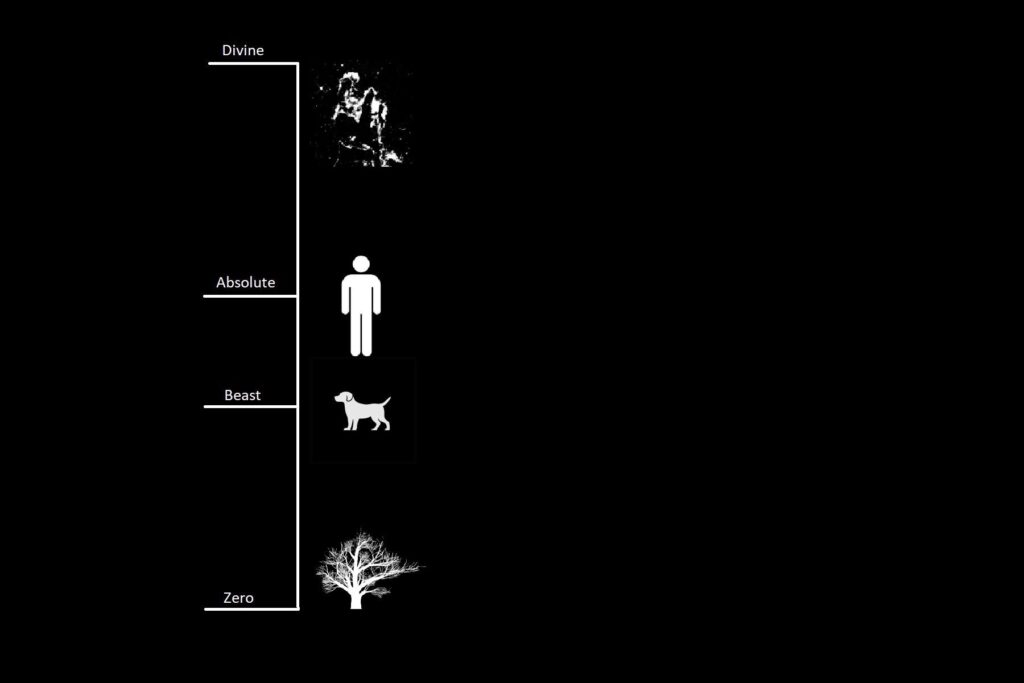Defining State of Being
Novaughn Miller
11/21/23
Purpose: To provide a scale that depicts levels of cognition, consciousness, morality, and ethics of living beings overall State of Being on a scale. This scale is meant to be used to guide morality towards a being not based on species, but based on its state of being. State of Being depicts living beings’ level of cognition, consciousness, and other variables that, although debatable, make up what’s often referred to as ‘state of mind.’ This State of Being scale will take into account biblical definitions to indicate unknown levels of cognition above what we consider human. State of Being is not equal for all belonging to the same species, as state of being refers to the status of the mind not body.

Divine State: A God in our biblical text throughout history is a being that has actions that are beyond our comprehension.
A God possesses:
- Omnipotence: the quality of having unlimited power.
- Omniscience: capacity to know everything.
- Omnipresence: property of being present anywhere and everywhere.
Although these things are hard to imagine, I argue these things are only difficult to comprehend due to having a lower level of State of Being than a God. For this entity we will define its consciousness by the presence of these three characteristics that have been historically agreed upon.
Absolute State: Under what has been defined as a God, the level of being most humans belong. However, calling it “Human State of Being” would incorrectly indicate that all belonging to the species are equal(for human beings mentally). For this reason, the term Absolute State of Being will be used to describe what most of us consider consciousness.
Absolute State Of Being contains:
- Language and Communication: Enables a being to convey abstract concepts, share knowledge across generations, and engage in sophisticated social interactions. While some animals can communicate using signals, sounds, or gestures, Absolute State beings’ language is more intricate and allows for the expression of a vast range of abstract ideas.
- Self-Awareness and Metacognition: Humans possess a developed sense of self-awareness, recognizing themselves as distinct individuals with a past, present, and future. Additionally, humans demonstrate metacognition: the ability to reflect on and monitor their own cognitive processes. This capacity for self-awareness and metacognition is not as pronounced in most animals.
- Conceptual Reasoning and Problem-Solving: Exhibits advanced conceptual reasoning and problem-solving abilities. This includes the ability to think abstractly, solve complex problems, and engage in higher-order reasoning.
- Moral Reasoning: Capacity for complex moral reasoning, considering abstract principles of justice, fairness, and ethical values. While the specifics of moral and ethical systems may vary across cultures and individuals, Absolute Being allows one to contemplate the consequences of our actions, consider the well-being of others, and make moral judgments. It is through consciousness that we can reflect on questions of right and wrong and engage in moral reasoning.
- Empathy and Social Connection: Ability to experience empathy and connect with others on an emotional and moral level. Ability to understand and share the feelings of others, which is a foundation for moral behavior and social cooperation.
Beast State: This State of Being is one that while still being a conscious state of mind, does not contain the all attributes of the Absolute State of Being. Animal’s State of Being includes:
- Consciousness: This is fundamentally subjective, however at its simplest, is awareness of internal and external existence.
- Emotions and Feelings: Conscious mental reaction (such as anger or fear) subjectively experienced as a strong feeling usually directed toward a specific object and typically accompanied by physiological and behavioral changes in the body
- Survival Instinct: Subconscious desire for self-preservation. Ability to be aware of danger, plan and execute actions to protect oneself, and adapt to changing circumstances. Ability to process information about the environment and our own well-being, which is essential for survival.
Zero State: Possess no attribute of cognition or consciousness.This can be observed in single celled organisms primary or plants. This means something may be “alive,” yet have no cognitive state of being
Example: A human, while being of the same species of another, may fall short of the Absolute State of being. A human lacking the ability to communicate, lacking self awareness, moral reasoning, etc, is closer to a beast than a human possessing the attributes of the Absolute. This human should be evaluated by their state of being rather than species for the betterment of the species itself.